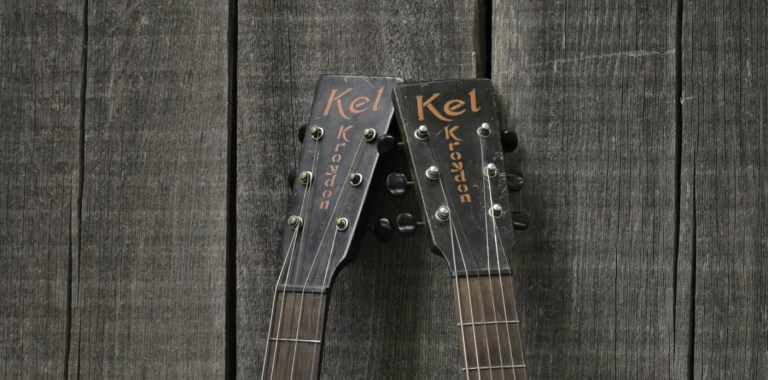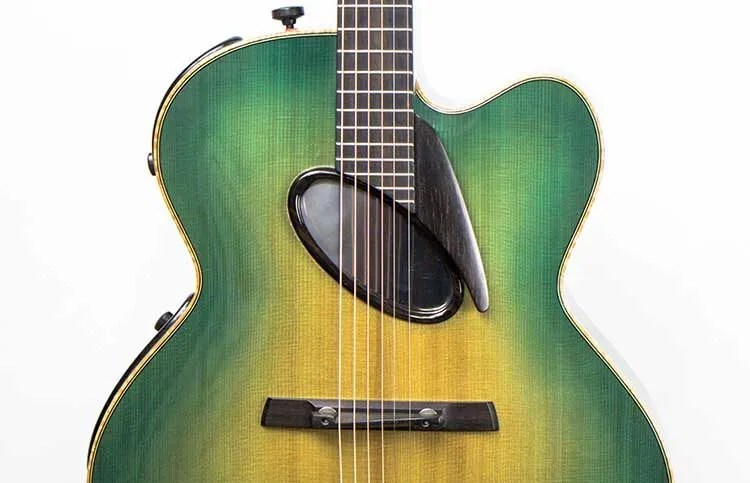Great Acoustics: Hank Williams’ Other Martin Guitar
One night, Hank Williams decided to swap guitars with a fellow performer on the Louisiana Hayride who shared his last name. Dock Williams, the guitarist for the Georgia Peach Pickers who was nicknamed “Curley” for his wavy hair, walked away from the deal with a distinctive Martin D-18. At the time, Curley had befriended the troubled country singer, whose reputation for drinking and hard living had left him ostracized by the Nashville establishment. Within a year, however, Hank’s 1949 classic “Lovesick Blues” became a big hit, attracting a mainstream audience, luring the singer away from the Hayride and back to the Grand Ole Opry, and helping to seal his place as a country legend.
Curley remained in relative obscurity, although music historian Colin Escott has called the Georgia Peach Pickers “one of the best hillbilly swing bands.” In the post-World War II era, the six-piece string band, which played jazz-inflected old-timey music while clad in bib overalls, plied its trade throughout the South at country fairs and in steamy West Coast dance halls. The farm-raised, curly-haired Dock Williams, who got his nickname from WSM radio host George D. Hay, who was known as the Solemn Old Judge, was the Peach Pickers’ leader.
ADVERTISEMENT
In the summer of 1948, after a two-year stint on the Grand Old Opry and a number of hits on the Columbia label, Curley moved his band—and his family—to Bossier, Louisiana, just across the bridge from Shreveport to perform on the Hayride, the popular concert series and radio show that helped launch the careers of Elvis Presley, Kitty Wells, George Jones, Johnny Cash, and many others. For a spell it served as a safe haven for Hank, already battling alcoholism and other inner demons.
“I don’t remember the exact date that Hank Williams joined the Hayride. He arrived in Shreveport with his wife Audrey and step-daughter Lucretia sometime after we did,” Curley’s daughter, Morelle Williams Henry, says. As a preteen, she performed every Saturday night with the Peach Pickers as Little Georgia Ann. “Audrey was pregnant with Hank Jr. and my mother was pregnant with my youngest sister. Hank and my father became friends immediately.“Hank was pretty down on his luck at that time… he loved my mother’s biscuits.”

Even after Hank’s big commercial breakthrough, he and Curley stayed in touch, and collaborated on a couple of songs. “I remember how devastated my father and mother both were when they heard of Hank’s death [in 1953],” Morelle says. “They attended his funeral.” When Curley died in 1970, the guitar he got from Hank was handed down to Morelle, who gave it to her son, Brent Weldon. C.F. Martin & Co., the current owner, acquired Hank’s D-18 in 2009 at Christie’s “Country Music Sale” auction for $134,500. “Many musicians have played this guitar between the years 1948 and 1970,” Morelle wrote in an authentication document. “Some of the more notable ones were Boots Harris, whose primary instrument was steel guitar, but who played the Martin at times. Jack Pruett, whose primary instrument was the electric guitar, played the Martin, too—Jack left the Peach Pickers in 1956 and moved to Nashville to play for Marty Robbins. Jack loved to strum that Martin…”
Williams’ fabled 1941 Martin D-28, owned by Neil Young, is the better-known guitar: Williams bought that one from Dobro legend and Nashville guitar-store owner Tut Taylor (the legend goes that Hank Jr. once traded it for shotgun shells) and Young immortalized it in the song “This Old Guitar” (you can see it in director Jonathan Demme’s Neil Young: Heart of Gold documentary and hear it throughout Young’s Prairie Wind album).
But Curley’s old D-18 may be even more deserving of its place in music history. “It is likely that Hank Williams personally purchased this Martin D-18 from Art’s Music Shop in Montgomery, Alabama, in March of 1947,” says Martin historian Dick Boak. “The grain of the top is distinctive, showing up in many promotional photos of Hank. Already having attained a degree of fame with the Drifting Cowboys, he performed with this guitar in his subsequent shows on the Louisiana Hayride and later during his famed years in Nashville.”





